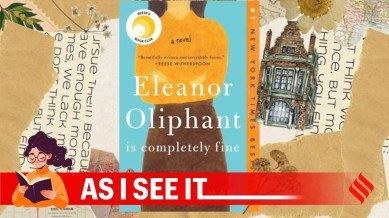Shruti Kaushal is a social media sieve and catches’em trends before they grow big, especially cinema. She has been a journalist for 5 years and covers trends, art and culture, and entertainment. ... Read More
© IE Online Media Services Pvt Ltd

“I have always taken great pride in managing my life alone. I am a sole survivor. I am Eleanor Oliphant. I don’t need anyone else.” — Eleanor Oliphant Is Completely Fine by Gail Honeyman
In a world that encourages being social, abhorring company is often mistaken for failure. Making plans every week off, staying active on social media, to keep on moving, the need to be seen is maddening. Loneliness, in contrast, is framed as something to be cured of, fixed, or hidden. But what if one viewed loneliness not as a void, but as a space, one with purpose?
Opening Honeyman’s much-talked-about 325-word novella, I was rooting for a character yearning for connection, someone who finds ways to escape her isolation. Instead, the book helped me own my being alone, not just single, mind you, just like Eleanor. She was not using her sadness as a performance but constructed a life of routine—frozen pizza, vodka on weekends, crossword puzzles—all framed around the quiet of solitude. And while that solitude stemmed from trauma, it was not wholly tragic. It was peaceful.
That idea made me question the concept of loneliness. Could it be something other than a crisis? As a woman in her late 20s, I have experienced both kinds of solitude, the heavy kind, yes. But also the kind that gave me clarity, offering calm. I come home to no one, also because I live alone or do not have someone to go out for coffee in the evening, at least not all the time.
I make my coffee, sit on the sofa, and scroll through my Instagram until I finish my iced latte. Mornings spent alone are not lonely but therapeutic. At times when my life feels chaotic, I actively retreat. Not out of fear, but by choice. I want to hear my thoughts without disruption because I need to remember what I want, outside of what I am to other people.
“When the silence and the loneliness press down hard, they are crowding me in,” muses Oliphant. I have felt the pressure Eleanor speaks of. But over time, I have also seen that loneliness can act as a mirror. When there is no one to perform for, no conversation to fill the air, what remains is you. And though that can be scary, it is also honest. For me, it was in that space that I stopped defaulting to “I’m fine.” In the quiet, I had to actually check in with myself. Not just function, but feel.
Eleanor, despite her pain, is not desperate to be rescued. She does not romanticise companionship. When connection enters her life in the form of Raymond, who is kind, sometimes awkward, and mostly decent, it does not save her. It complements her and she simultaneously remains her own anchor.
“You can’t have too much dog in your life.” This quirky one-liner may be about Glen the rescue dog, but it reflects something deeper. Oliphant learns that connection can be gentle, non-intrusive, and even quietly joyful. But crucially, she doesn’t abandon her solitude. Instead, she creates space for both: the richness of being alone and the need to be known.
That duality changed my perception of life. Loneliness, I have come to believe, is not something to run from. It is a landscape to explore. Yes, it can ache at times. But it can also heal. It is where boundaries are drawn, priorities clarified, and inner voices heard. Of course, not everyone can crack this. In an era addicted to distraction, choosing loneliness can look stupid, like a sign of depression or failure. But for me, it has become a quiet strength. It allows connection to be a choice, not a crutch. And when I do let people in, I do so when the chords strike and not out of hunger.
“These days, loneliness is the new cancer—a shameful, embarrassing thing, brought upon yourself in some obscure way.” Oliphant remarks. Honeyman critiques that shame, and rightly so. But she also offers a simple narrative that loneliness isn’t a defect to be diagnosed, but a place where people can rebuild.
I am still learning how to live at the intersection of loneliness and connection. Some days, I crave company. Other days, I crave the quiet. But, I no longer conflate loneliness with lack. Sometimes, it simply means that this moment is mine. And that, I have realised, is not just fine. It is necessary.
(As I See It is a space for bookish reflection, part personal essay and part love letter to the written word.)